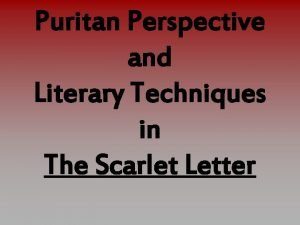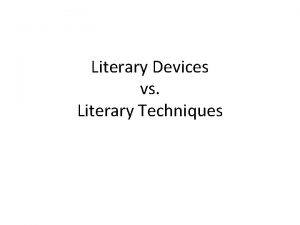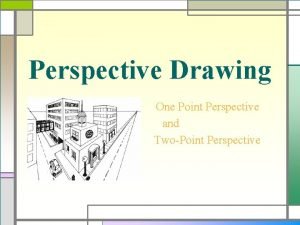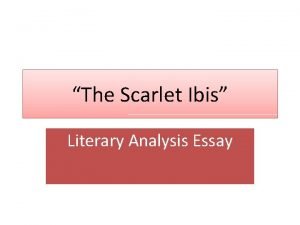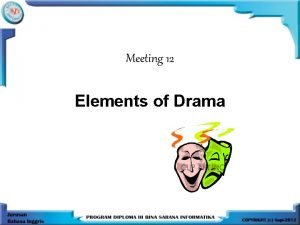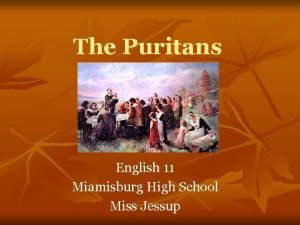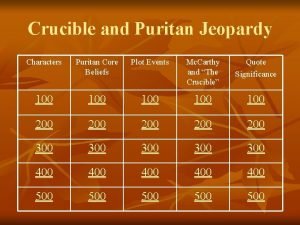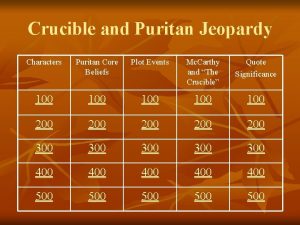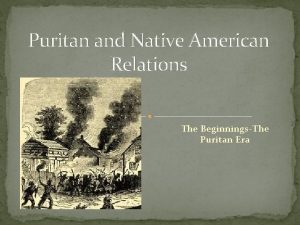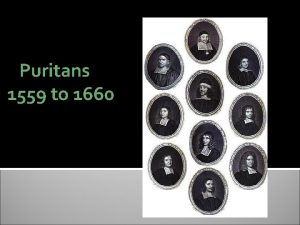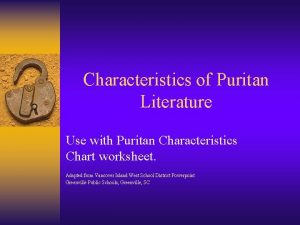Puritan Perspective and Literary Techniques in The Scarlet












- Slides: 12

Puritan Perspective and Literary Techniques in The Scarlet Letter

Puritan Beliefs • Theocracy: religious and political law are the same • Predestination: God has predetermined who is saved and who is damned • God has a plan for all humankind. Good will prevail over evil, and Christ will defeat Satan. • Goals: cleanse society of corrupt, sinful actions/vices and experience “conversion” to lead a righteous life

Predestination • Innate “depravity” : humans are innately sinful (original sin) • Unconditional “election”: Salvation in reserved for those chosen by God • “Irresistible Grace”: Good works do not save an individual. ” An “elect” group of “saints” possess God’s saving grace

Questions to Explore • Why did followers of Puritanism accept this doctrine? – Need for order, certainty, spiritual security • Effects on Puritan lives? – Committed to shaping society and government into what God would desire - Strove to live godly lives—disciplined, sin-free - Living a righteous life was the EFFECT of being one of God’s chosen - To ensure salvation (not to gain or earn), Puritans attempted to display signs of purity as evidence of God’s saving grace. • How does Hawthorne challenge Puritan beliefs?

Literary Devices • Descriptive Details • Imagery • Irony • Characterization • Figurative Language • Allusion • Symbols

Diction: !Word patterns and individual words – vocabulary and its degree of difficulty, complexity, abstractness, etc. – “The wretched minister!” (202) – “Hester… must take up again the burden of her ignominy, and the minister the hollow mockery of his good name!” (179) !Imagery – descriptive language and figures of speech used to convey abstract ideas in vivid, innovative ways

Point of View: !Omniscient: able to recount the action thoroughly and reliably, and able to enter the mind of any character at any time; can conceal as well as reveal at will. !Direct address: “Satan, that afternoon, had surely led the poor girl… and thrown her into the pathway of this solely tempted, or – shall we not rather say? this lost and desperate man” (200). “we blush to tell it…” (201).

Paradox: !A statement that seems selfcontradictory or nonsensical on the surface, but may be seen to contain an underlying truth. – Dimmesdale’s attempt at categorizing himself as a sinner, and the people’s reverent response

Allusion: !An indirect reference to a person, event, statement or theme found in literature, the other arts, history, mythology, religion or popular culture – “Another man had returned out of the forest: a wiser one; with a knowledge of hidden mysteries which the simplicity of the former never could have reached. A bitter kind of knowledge that!” (203)

Symbols: !Something that, although of interest in its own right, stands for or suggests something larger and more complex – The Scaffold – Roger Chillingworth – Pearl – The Scarlet Letter – The Forest – The Brook

Themes: • Consider questions, rather than answers • Psychological novel – What aspects of human nature does Hawthorne focus on? What do we learn or observe about those aspects?

 Literary techniques in the scarlet letter
Literary techniques in the scarlet letter The scarlet letter essay topics
The scarlet letter essay topics Scarlet letter 23
Scarlet letter 23 Basic literary techniques
Basic literary techniques One point perspective lettering
One point perspective lettering Silo perspective vs business process perspective
Silo perspective vs business process perspective The scarlet ibis writing prompt
The scarlet ibis writing prompt Literary elements of literature
Literary elements of literature Literary elements and techniques
Literary elements and techniques Setting elements of drama
Setting elements of drama Daforest
Daforest Literary techniques in romeo and juliet
Literary techniques in romeo and juliet Puritans beliefs
Puritans beliefs
